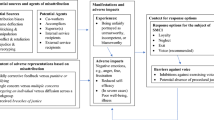Abstract
Impression management refers to behaviors used by individuals to control the impressions they make on audiences. This study demonstrated that business men and women were more likely to defend their questionable behavior by using excuses and justifications than to openly concede errors of judgment and behavior. Three hundred and sixty two participants received a scenario in which they had allegedly engaged in questionable behavior. The participants then wrote a position paper explaining their actions. Results indicated that people in business attempt to avoid being associated with potentially negative interpretations of their behavior primarily through the use of justifications and excuses. In general, the types of responses were relatively consistent across work experience, educational and occupational levels. However, in some instances the specific explanations used depended on gender and age.
Similar content being viewed by others
References
Allen, R. W., Madison, D. L., Porter, L. W., Renwick, P. A., and B. T. Mayes: 1978, ‘Organizational Politics: Tactics and Characteristics of its Actors’, California Management Review 22, 77–83.
Cohen, J.: 1968, ‘Weighted Kappa: Nominal Scale Agreement with Provision for Scaled Disagreement of Partial Credit’, Psychological Bulletin 70, 213–220.
Cohen, J.: 1960, ‘A Coefficient of Agreement for Nominal Scales’, Educational and Psychological Measurement 20, 37–46.
Darby, B. W. and B. R. Schlenker: 1982, ‘Children's Reactions to Apologies’, Journal of Personality and Social Psychology 43, 742–753.
Giacalone, R. A. and H. G. Pollard: 1987, ‘The Efficacy of Accounts for a Breach of Confidentiality by Management’, Journal of Business Ethics 6, 393–397.
Goffman, E.: 1963, The Presentation of Self in Everday Life (Doubleday, Garden City, NY).
Henderson, M. and M. Hewstone: 1984, ‘Prison Inmates' Explanations for Interpersonal Violence: Accounts and Attributions’, Journal of Consulting and Clinical Psychology 52, 789–794.
Longenecker, C. O., Gioia, D. A., and H. P. Sims: 1987, ‘Behind the Mask: The Politics of Employee Appraisal’, The Academy of Management Executive 1, 183–193.
Mehlman, R. C. and C. R. Snyder: 1985, ‘Excuse Theory: A Test of the Self-Protective Role of Attributions’, Journal of Personality and Social Psychology 49, 994–1001.
Pinder, C. C.: 1984, Work Motivation: Theory, Issues, and Applications (Scott, Foresman, and Company, Glenview, ILL).
Riordan, C. A., Marlin, N. A., and C. Gidwani: 1985, ‘Accounts Offered for Unethical Research Practices: Effects on the Evaluations of Acts and Actors’. Unpublished manuscript.
Russell, B. Quoted in Andrews, R.: 1987, The Routledge Dictionary of Quotations (p. 53) (Routledge and Kegan Paul Limited, London).
Ryan, W. R.: 1972, Blaming the Victim (Random House, New York).
Schlenker, B. R.: 1980, Impression Management: The Self-concept, Social Identity, and Interpersonal Relations (Brooks/Cole, Monterey, CA).
Schonbach, P.: 1980, ‘A Category System for Account Phases’, European Journal of Social Psychology 10, 195–200.
Scott, M. B. and S. M. Lyman: 1968, ‘Accounts’, American Sociological Review 23, 46–62.
Weiner, B.: 1985, ‘An Attributional Theory of Achievement Motivation and Emotion’, Psychological Review 92, 548–573.
Weiner, B., J. Amirkhan, V. S. Folkes, and J. A. Verette: 1987, ‘An Attributional Analysis of Excuse Giving: Studies of a Naive Theory of Emotion’, Journal of Personality and Social Psychology 52, 316–324.
Author information
Authors and Affiliations
Additional information
Conventional people are roused to fury by departure from convention, largely because they regard such departure as a criticism of themselves.
Bertrand Russell (1872–1970)
Mary Konovsky is an assistant professor of organizational behavior at the A. B. Freeman School of Business of Tulane University. She received her Ph.D. from the Indiana University School of Business in 1986. Her research interests include procedural justice in organizations, organizational citizenship behavior, and ethics in management decision-making.
Frank Jaster is Executive Vice President of Aegis Consulting & Training, Inc., Denver, Colorado, and Adjunct Professor of Management Communication at Tulane University. His doctorate is in American Literature from Tulane. His current research interests are in entrepreneurship, business ethics, and the (sometimes hostile) relationship between business and the media.
Rights and permissions
About this article
Cite this article
Konovsky, M.A., Jaster, F. “Blaming the victim” and other ways business men and women account for questionable behavior. J Bus Ethics 8, 391–398 (1989). https://doi.org/10.1007/BF00381731
Issue Date:
DOI: https://doi.org/10.1007/BF00381731




